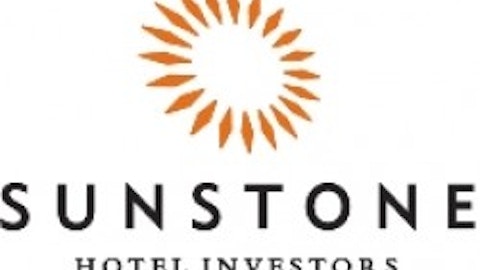One of the real benefits of the luxury hotel business is that it tends to outperform other major hotel businesses during economic recoveries. Specifically, lodging tends to have an 80% correlation with GDP. During the recovery years of 1992 to 2000, the industry saw nine straight years of RevPAR growth, 8.9% annually. And then from 2002 to 2007, the industry had five straight years of RevPAR growth, 8.2% annually.
Company Tailwinds
As the only pure-play high-end lodging REIT, Strategic estimates its average replacement costs, excluding land, are at more than $750,000 per property. For 2013, growth in total hotel RevPAR is likely to be between 5% and 6%. Strategic is also looking to dispose of two of its non-core assets.
The other key benefit for Strategic is that it enjoys industry-leading earnings before interest, taxes, depreciation and amortization (EBITDA) per available room. For 2012, Strategic generated $81 per room of EBITDA. Compare this to top comps LaSalle Hotel Properties (NYSE:LHO) at $74 per room and Pebblebrook Hotel Trust (NYSE:PEB) at $71. The reason for this is that Strategic is much less reliant than its peers on rooms, with much greater exposure to food and beverages. Strategic earns 53% of its revenue from rooms, while its peers get around 66% of revenues from rooms.
The Upside
Orange Capital estimates Strategic could fetch $11 to $14 a share if sold, which would equal upside of 25% to 60%. The valuation is supported by the fact that Strategic’s properties are in prime locations that cannot be duplicated. Orange also believes that the company has to push for a sale to ensure shareholders’ best interest. This, given its leveraged balance sheet, makes the return of capital to shareholders in the form of dividends or repurchases unlikely.
The most difficult aspect to valuing Strategic is that there is no publicly traded competitor that owns similar hotel properties. What has happened is a disconnection between the public and private valuation for Strategic’s hotel properties. One Raymond James analyst noted: “The best way for them to close the valuation gap that exists between the public valuation and the private valuation, or what the collection of assets are worth, ultimately is the sale of the company. The portfolio is one of the best portfolios of hotel assets that has ever been put together. We think there are groups out there that would love to own the assets.”
Risks to consider: The big risk is that the economy takes a step back in its recovery, as the luxury hotel industry is heavily tied to the broader economy. The other risk is that a buyer comes to the table, but the deal fails to materialize and the stock tumbles.
Action to take –> Buy this luxury hotel REIT for a buyout, but in the worst case, you’re getting the assets for less than replacement cost. The company has taken a big step in the sale process by hiring an advisor to help monetize its impressive asset base. In a sale, the company could see upside of more than 25%. Regardless of how a sale shakes out, investors should continue to enjoy Strategic’s success on the back of a rebounding economy.
P.S. — Whenever you find a company with trophy assets like BEE, it’s possible you’ve found what we call a “Forever” stock. When you own “Forever” stocks, you no longer need to worry about inflation or deflation… bear markets or recessions… “flash crashes” or “fiscal cliffs.” Click here to learn more.
– Marshall Hargrave
Warren Buffett’s Top 5 Stocks
Buffett’s firm, Berkshire Hathaway, holds dozens of stocks. But these five make up 75% of its portfolio… worth $65 billion. Click here to get Buffett’s top 5 stocks plus his 16 latest buys, FREE.





